Here’s how to market your online course in 50 ways that work!
You spent a whole lot of time, energy and resources building your online course. Now you need to get eyes on it!
How you market your online course is just as – if not more – important as the course content itself. After all, if no one knows it exists, how are they going to buy it?
Whether you’re still contemplating creating a course, or you’re scratching your head wondering how to make your course reach the right people, we’ve got you.
In this article, we’ll show you how to market your online course to your target audience and get people learning from your wealth of knowledge.
If you’re course isn’t ready or published yet, check out the Memberpress Courses add-on that makes it easy to build and sell your online course with features including:
- Quizzes and assignments
- Built in progress tracking
- Course completion certificates (with an option to add expiry dates)
- Drag-and-drop builder
- … and a whole lot more!
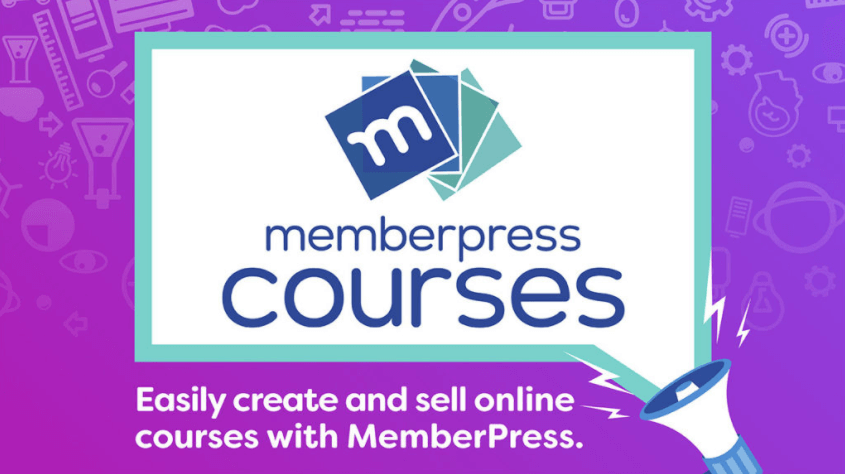
50 Easy Ways to Market Your Online Course
Without further ado, here are 50 key ways to market your online course, designed to captivate your target audience and transform your expertise into a thriving educational venture.
1. Build a Strong Brand
Literally everything else on this list will be a heck of a lot easier if you have a strong, easy-to-recognize brand.
Ideally, you want your brand to communicate what it is that you offer. This will make it easier for people who are searching for your course online.
Take The Positive Birth Company, for example. The company name gives you a clear indication about the topic and purpose of their courses, while their logo reflects their name.

Their bestselling Ultimate Birth Pack course is also clearly named and featured prominently on their site so that visitors are aware of their most popular flagship product.
Read the Crested Butte Museum story to learn more about building an online presence.
2. Optimize Your Course With SEO
Optimize your course descriptions, blog posts talking about the course, and your website with relevant keywords so that your audience can find your course through organic Google search.
Here’s a handy article with a crash-course on how to optimize your content for SEO.
Remember, if your course is behind a paywall, search engines won’t be able to crawl that content, but there are still things you can do. This guide to SEO for paywalled content can help you out.
There’s also this thing called Schema markup which allows your course to appear in those fancy lists generated by Google (known as rich snippets).
For managing all of the above, we recommend using a plugin like AIOSEO. It allows you to easily optimize your site without having to get too technical or have an in depth understanding of how search engines work. Let’s face it, you’ve got plenty to be getting on with already.
3. Create Email Campaigns
Email is still a great way to convert curious visitors into loyal students. You can use email content to encourage regular engagement in your site’s content and help move potential customer along the sales funnel.
You can read all about building an email list here.
Develop segmented email campaigns that target different groups within your audience based on their interests and behaviors.
Remember to include compelling CTAs and special discounts to encourage enrollment.
4. Share on Social Media
Regularly post engaging content about your course on social platforms like Instagram and Facebook.
Create carousels showing short clips of interesting parts of your course that you know your audience will be curious about. Create reels answering questions people are asking about the course.
5. Create a Course Trailer
Design a captivating video trailer that highlights the unique selling points of your course, showcasing instructor insights and sneak peeks of course content.

6. Host Webinars Related To Your Course
Host informative webinars that provide value related to your course topic. Use these sessions as an opportunity to promote your online course and introduce viewers to your course structure and content.
7. Start an Affiliate Program
Market your online course by creating an affiliate program where you can partner with industry influencers, bloggers, and content creators to promote your online course to their followers. Offer them a commission for each sale they generate.
Learn more about affiliate programs and how to create one here.
8. Guest Post For Popular Blogs
Write and publish informative articles on popular blogs and websites in your niche. Use this content to demonstrate your expertise and direct readers to your course with a strong call to action.
9. Use Google Ads
Implement pay-per-click advertising campaigns on Google to target potential students actively searching for courses like yours.
Read how to create course ads that sell here.
10. Leverage Facebook Ads
Promote your online course by leveraging Facebook’s advanced targeting options to reach specific demographics who are most likely to be interested in your course.

11. Offer Course Discounts
Provide promotional codes or seasonal discounts to create urgency and encourage prospects to make a decision faster.
You can easily offer coupons for your courses with MemberPress.
12. Build a Content Strategy
Build a content strategy that includes creating helpful, relevant content that addresses common questions or challenges related to your course topic.
13. Engage in Online Communities
Engage in online forums and groups related to your course subject. Regular participation can help you build trust and authority within your community.
14. Ask for Testimonials and Reviews
Collect and display testimonials from your students to enhance your course’s credibility. Video testimonials can be particularly effective.
15. Partner With Other Course Creators
Form strategic partnerships with other educators or organizations that can offer complementary benefits to your students.
16. Use Press Releases
If your course is espeically newsworthy, consider sending out a press release to relevant media outlets to announce the launch of your course, highlighting its unique aspects and benefits.
17. Talk About Your Course On a Podcast
Identify and appear on podcasts where you can discuss your course’s subject matter, providing valuable insights to listeners and subtly market your online course. You can also start your own podcast.
18. Post On Your YouTube Channel
Create and maintain a YouTube channel where you post educational content and tutorials related to your course themes and add a link in your description for people to buy your course.

YouTube is a great opportunity to promote your online course because you get to talk about your course and convince people to buy. You can also link up with other YouTubers. Create a video with them or ask them to talk about your course.
19. Write LinkedIn Articles
Writing and posting articles on LinkedIn is also a great way to market your online course. It positions you as a thought leader and direct professionals to your course.
20. Offer Referral Bonuses To Your Students
Promote your online course by setting up a referral program that rewards current students for referring new students to your course.
21. Share on Your Instagram Stories
Use Instagram Stories to share daily updates, behind-the-scenes content, and interactive polls or Q&A sessions about your course.
22. Create Pinterest Pins
Pinterest is an often overlooked social media channel, which makes it a less competitive space! Depending on your audience it can be a great way to reach them.
Create and share visually appealing infographics or cheat sheets related to your course content on Pinterest.

23. Organize Quizzes and Contests
Organize contests with the prize being free access to your course. This can increase engagement and spread awareness.
You can also create quizzes with MemberPress Quizzes. You can add engaging quizzes to your course or add quizzes on your website that will lead your audience to take your course.
That is, after they take the quiz and get their result, let them know they can learn more through your course.
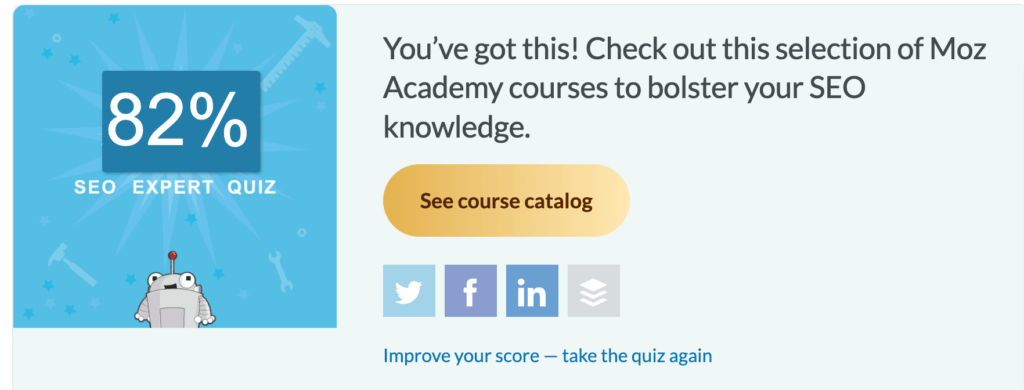
24. Offer Early Bird Specials
Offer special pricing for students who enroll in your course during the pre-launch phase. This will probably get people to buy, knowing that is the only time they can get for that price.
25. Blog About Your Course
Promote your online course by regularly updating your blog and providing valuable content related to your course’s topic.
Plug your course into your blog posts at intervals or where necessary but don’t overdo it.
26. Schedule Q&A Sessions:
Schedule live Q&A sessions on Instagram, Facebook, or YouTube, where potential students can ask questions directly related to the course content and delivery.
27. Provide Free Mini-Courses
Offer a free introductory module or mini-course to give prospects a taste of what they can expect from the full course.
This is a great way to generate leads and stay in contact with potential students who have already shown interest in what you have to offer.
28. Speak At An Event
Speak at or sponsor an online or local events and workshops where you can promote your course to a relevant audience.
29. Promote Your Online Course With Your Email Signature
Include a brief, engaging pitch and a link to your course in your professional email signature.
30. Use Remarketing Ads:
Use Google Ads tag to create remarketing/retargeting campaigns which will show ads to people who have visited your course page but left without enrolling.
31. Collaborate with Businesses
Find businesses that might benefit from your course and offer it as part of their professional development tools for employees. That way you can easily promote your online course.
32. Collaborate with Influencers
Collaborate with influencers in your industry to create content that showcases the practical applications of your course. This could involve live demonstrations or case study reviews.
33. Engage in Seasonal Promotions
Align your course promotions with relevant seasonal events or industry-specific dates. For example, offer a discount during back-to-school seasons or industry-specific awareness months.
34. Create a Membership Community
Promote your online course by establishing a membership community that offers additional value such as exclusive resources, ongoing support, or networking opportunities.
This can create a more engaging environment for students where they can talk about what they have learned and ask questions. You can also sell them future courses.
35. Try Mobile Marketing
Optimize your marketing efforts for mobile users, including SMS notifications and mobile-friendly course access, to cater to students on-the-go.
36. Partner with Libraries
Market your online course by partnering with local libraries or community centers to offer introductory sessions or workshops based on your course content, increasing local awareness and accessibility.
37. Create Resource Guides
Resource guides can serve as a lead magnet. Develop comprehensive resource guides that can be offered as a free download in exchange for email addresses, which you can later use to market your online course.

38. Use SlideShare to Promote Your Online Course
Promote your online course by creating presentations related to your course content and share them on SlideShare. Embed links back to your course landing page within the presentation.
39. Participate in Trade Shows
Promote your online course by setting up a booth at relevant trade shows and industry conferences. This can be a great way to get in front of a targeted audience.
40. Use Interactive Content to Market Your Online Course
Create interactive content such as quizzes, polls, or interactive infographics that can be shared across social media platforms to engage potential students and drive traffic to your course.
You can add gamification to your course with the Memberpress Courses add-on.
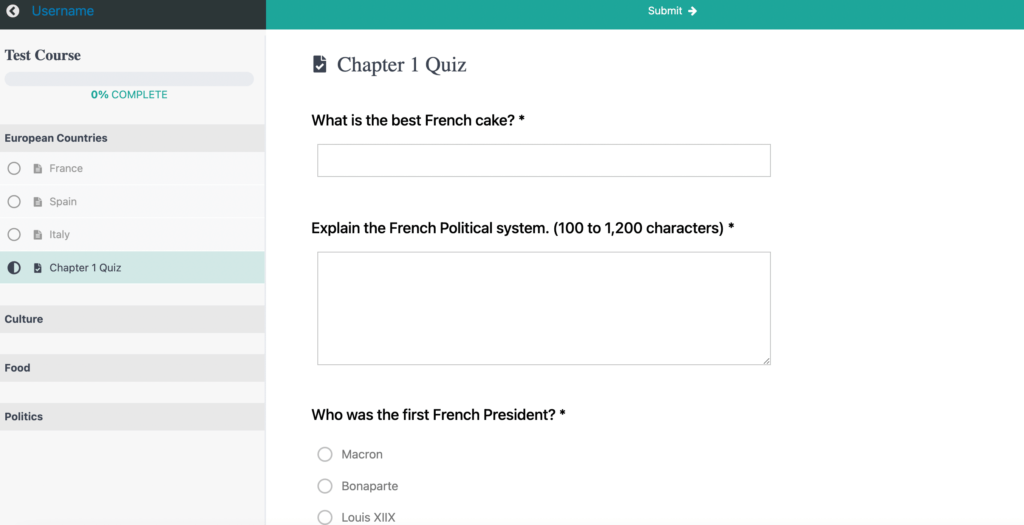
41. Use LinkedIn Learning Hub
If your course is professional in nature, consider publishing part of your content on LinkedIn’s Learning Hub to tap into a professional audience that’s already seeking educational opportunities. Then lead students to the full course on your website.

42. Offer Scholarships or Grants
Provide a limited number of scholarships or grants for your course to generate interest and give access to students who may not otherwise be able to afford it. This is an indirect way to market your online course.
43. Bundle Courses
Bundle your course with other related courses or products to offer comprehensive value at a reduced price. This can attract students interested in a broader learning path.
44. Use TikTok for Micro-Learning Sessions
Utilize TikTok to create short, engaging educational content that leads viewers to your full course. This platform is especially great for reaching a younger demographic.
45. Join Facebook Groups Related to Your Course
Search for facebook groups related to your course and join the community. Become a known member by sharing, commenting, and joining conversations.
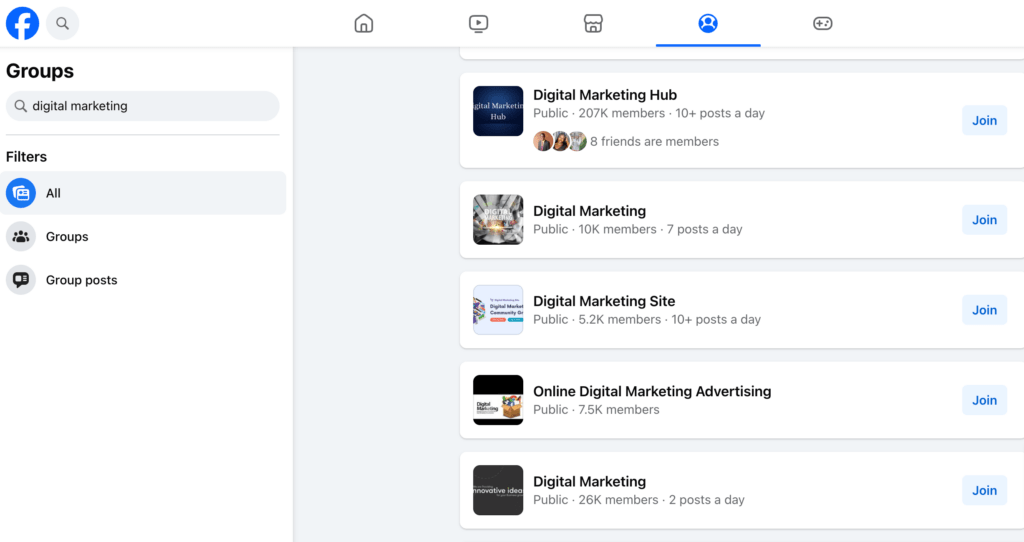
You can also answer questions related to your course. If you’re very helpful, group members will not hesitate to buy your course.
46. Partner with Educational Institutions
Market your online course by partnering with educational institutions or online learning platforms.
You can search for these institutions via LinkedIn and reach out to them through their email address. CRM tools like HubSpot is also create for managing partnership leads.
47. Translate Your Course For Inclusivity
Translate your course into another language and make it available for other people in other countries. This will expand your audience and also make your students feel inclusive.
48. Promote Your Online Course with Quora
Go on Quora and answer questions relating to your course consistently. The more helpful you are, the more people are inclined to click. You should also update your Quora bio with your website and course link.
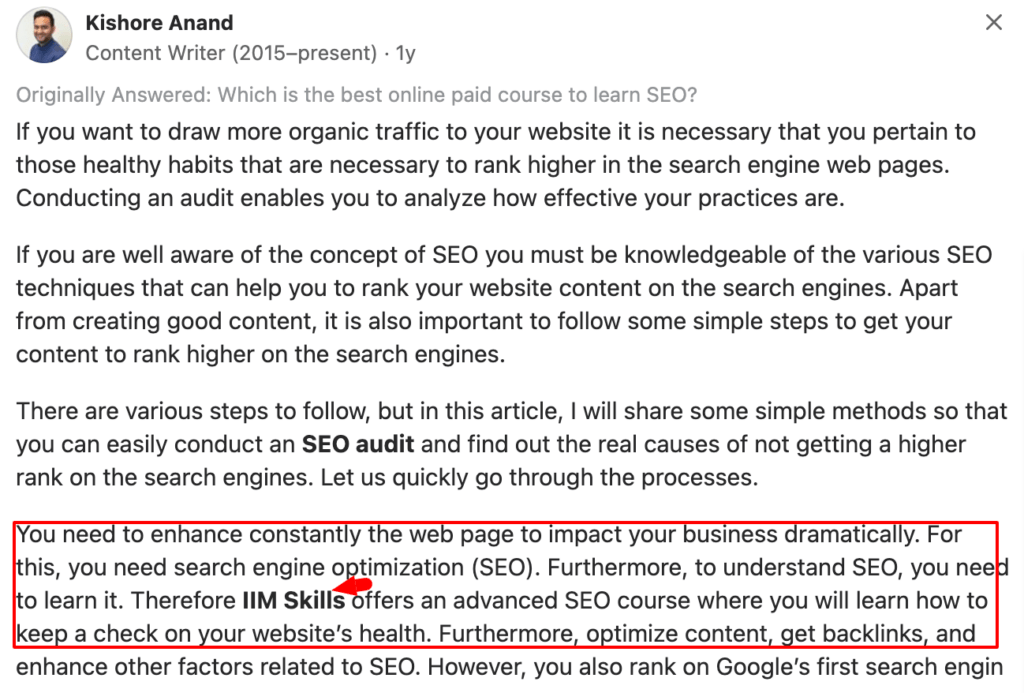
49. Allow Payment Plans
Allow potential buyers to pay for your course in installments. You can offer weekly or monthly payment plans.
For example, if your course is sold at $300, you can allow your student pay over a period of 6 months. This means they will pay $50 per month.
You can use the MemberPress Courses drip feature to make sure that these students don’t have access to the full course until they’ve made all of their payments.
50. Cross-promote with Other Courses
If you already have a previously published course doing very well, you can promote your new course by adding a video trailer about it in the former course or adding a link to it in your course description.
You can also suggest the new course during checkouts.
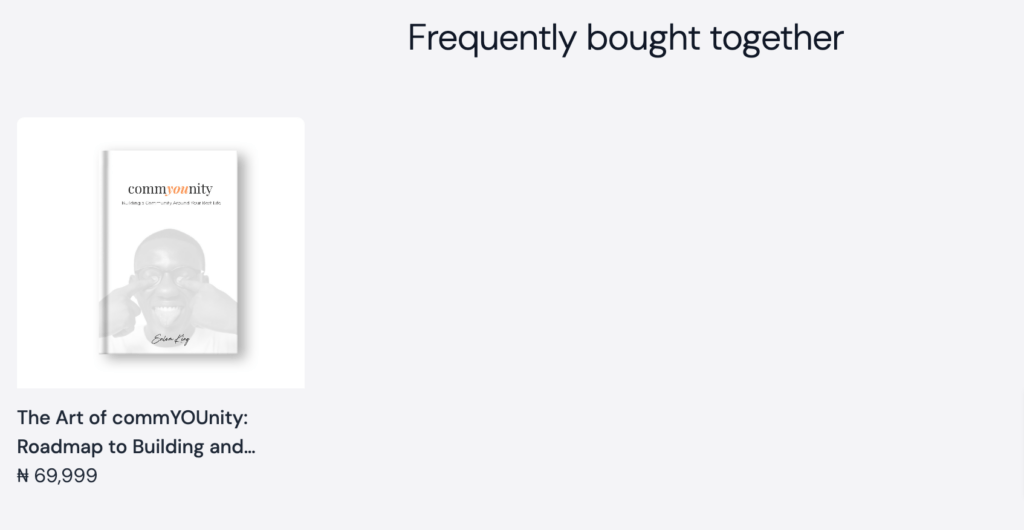
MemberPress Pro customers can easily offer one-click upsells at checkout with OrderBumps™.
Which One Are You Starting With?
Phew! That’s a lot of opportunities to boost your course sales!
You’ve got 50 interesting ideas to work with, so the big question is, which strategy will you try first?
Which ones you choose will depend on your audience and your subject matter. Don’t feel overwhelmed. Make it fun and learn new things while you are at it. Let us know if you have any questions in the comments section.

Get MemberPress Today!
Start getting paid for the content you create.
If you found this article helpful, subscribe to our newsletter below and be sure to follow us on Facebook, Twitter, Instagram, and LinkedIn!















I’m moving all my online courses to Memberpress and soon I’ll come back and show with you guys my goals 🙂
Great post!
In addition to above items, I’d add “offering support.” And with “support” I mean replying as fast as possible and provide users with solutions/answers to their issues/questions. Getting a user is very important, but getting recurrent users has higher importance.
I really loved your article Rizza and I look forward to becoming like you . The article really helped me and I learnt a lot . Thank you so much
I am working on finishing up my first course for one of my websites and this article takes away the fear of creating a course that nobody will ever see or value. Thank you for taking the fear out of that part of the process. I plan to use this as a step-by-step guide.
Great tips for making online courses appealing! Understanding student needs is key to creating engaging content. Thanks for sharing these actionable insights
This article provides great insights into how to effectively attract students to online courses. I appreciate the practical tips on building engaging content and leveraging marketing strategies to reach a wider audience. The suggestions are incredibly helpful for anyone looking to grow their online course offerings.
We’re glad to hear that, thank you!
Thanks for this!
I’m going to launch my first online course soon. I’m still figuring out how to best promote it. Thanks for the article. It gave a bunch of new ideas.
Happy to hear that, Guillermo! We’re glad we can help 🙂